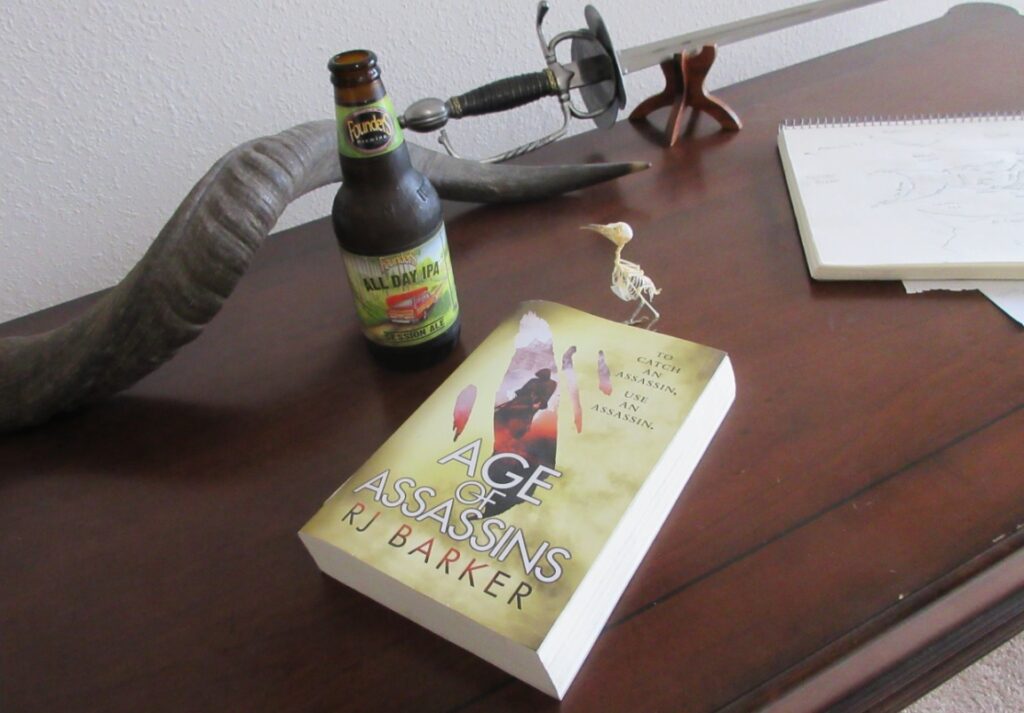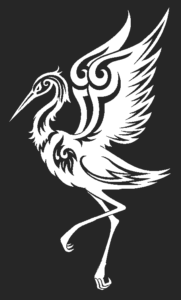Age of Assassins by RJ Barker
 I know RJ likes taxidermy and antlers…I don’t have antlers but I have this bird skeleton and horn.
I know RJ likes taxidermy and antlers…I don’t have antlers but I have this bird skeleton and horn.
RJ Barker’s entrancing fantasy-mystery Age of Assassins is a bit of an odd duck—there aren’t many actual assassinations in it, but it’s easy to forget that as the story of young apprentice assassin Girton unfolds. Apparently the age of assassins is fifteen (heh). Girton and his master are summoned to protect the heir to a decaying, tired land. It doesn’t help that the heir is a piece of garbage and any number of people could want him dead. Going undercover in a deadly game of killer vs killer, our young hero discovers disturbing things about himself and the tenuous political situation that will have implications for the wider world. One is conscious that this is the first in a trilogy, as a large part of the story focuses on Girton and his development as an assassin, and as something else entirely.
Central to this is the world of the story. Maybe it says something about modern fantasy readers that many modern works view magic as a draining, malevolent force. In this world, sorcery has long ago sapped the land and its people of vitality, and any hint of it is met with an instinctive frenzy of revulsion and hate. Blood of innocents is spilled without a second thought to keep it at bay, and anyone tainted with it can expect a fate worse than death. Magic is a disease, or so we’re led to believe.
That sounds pretty grim, but as a consequence this world also inhabits a midpoint between our mundane existence and full-on fantasy, allowing the inclusion of creatures such as the ubiquitous “mounts,” which are basically deer on steroids. This invention by Barker, who has a famous affinity for antlered things, signals that though familiar, this is at heart an alien world, and we shouldn’t expect it to conform to our conceptions.
Additional world-building is done without much infodump exposition but through clever conversational devices. Most notably is a dramatic performance in the middle of the book that acts out much of the history and mythology of the world. The specifics include points relevant to the plot, so it never feels tedious.
The central character Girton is cursed with a club foot. This alone is interesting, as protagonists with disabilities are still rare. I was often reminded of Joe Abercrombie’s antagonist Inquisitor Glokta. Girton’s deformity serves as a source of constant physical pain, and perhaps as a stand-in for the mental pain of being a teenage boy. I was a bit annoyed at Girton and his eye-rolling drama for a lot of this book. He seemed like a whiny teenager with trivial problems and I wanted to slap him more than once. But this is true to the character, and likely intentional. The incongruence of a trained killer that’s shy and awkward strains believability at first. Eventually I began to sympathize with him, as the problems he faces—difficulty being accepted by the other squires that he’s only pretending to be, bullying by entitled jerks, embarrassment at his own existence—were fleshed out as relevant even in a fantasy world. Perhaps mirroring this, the writing style can become a tiny bit frenzied or awkward in some places. But this thing was written in like six weeks, so it fits. One thing that gave me a little pause was the ease of killing people. The dance-like fighting style is an interesting approach, but numerous nameless “guards” fall like filler NPCs in a video game. Taking lives should not be so casual, and this can begin to feel out of step with the deep emotional resonance of the rest of the story.
As Girton’s skills develop parallel with the plot, there is a shocking—though maybe not to a reader who’s paying attention—revelation about him and his relationship to his master that answers questions you might have had previously. There follows a palpable sense of betrayal and self-questioning which will clearly figure in future volumes. There’s also an uncomfortable Oedipal relationship between Girton and his “my master.” Her continual sighs of “Oh, Girton,” are best left to the imagination. It is unacknowledged, but adds an additional layer of depth to the story. Whether this is intentional or not, only RJ knows.
I wish fantasy novels didn’t seem obligated to end with an epic battle. This is at its core a story about assassins, not knights and kings. Still, by the end I found myself identifying enough with Girton that I definitely will continue the series with Blood of Assassins and King of Assassins to see how his story develops, and to see him spread his wings and come out from the shadow of his master. Books two and three are already out, and just from the covers we can see that he will play an important role in the wars to come as befits a legendary assassin, and as something else entirely.
RJ Barker’s website: RJBarker.com
Pairs well with: Founders All Day IPA
Founders has a solid lineup, and I’ve never had anything from the brewery that I dislike. I’m not really an IPA guy, I usually stick to stouts and porters and abbey ales. Maybe wheat when I’m feeling adventurous. So the All Day IPA is a good compromise for people who like some bitterness, but not too much. Only 40 IBUs and 4.7% abv, you can drink it throughout the day. It’s got some grapefruit flavor up front, then a lot of pine, and a clean finish that doesn’t quite make me want to curl my tongue in hopicidal horror. There’s a certain bitterness at the heart of Age of Assassins too, so I think this beer goes well with it.
